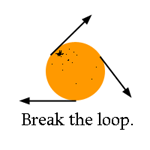

 | Tangentium |
January '04: Menu
All material on this site remains © the original authors: please see our submission guidelines for more information. If no author is shown material is © Drew Whitworth. For any reproduction beyond fair dealing, permission must be sought: e-mail drew@comp.leeds.ac.uk. ISSN number: 1746-4757 |
Feature Essay: Language Engineering and Public PolicyKevin CareyPage 1 ¦ Page 2 ¦ Page 3 ¦ Page 4 ¦ Printer-friendly version Specialisation, heterogeneity and choiceThere are reasons other than differing intellectual levels which lead to the requirement for a variety of renderings of a source document. We are both more specialised and more heterogeneous than we have ever been before in our intellectual and lifestyle pursuits. We may want a White Paper on housing in full text but one on foreign policy in a shortened or simplified form. We may simply, for example, want the Iraq Dossier without comment or we might want the ten major points as defined by the author in his tagging. Whatever the reason, this is not simply a call for simplification to accord proper rights to those with cognitive difficulties. It is a recognition of our lifestyle. These issues naturally lead on to the idea that what consumers of public affairs information require is choice; in this case not choice of raw material or choice of source material but choice of intellectual rendering. Transparent IntermediationCurrently the varying intellectual gifts and aptitudes, time and resources of our citizens mean that in the sphere of public and political debate they rely upon the services of intermediaries. The problem is that these intermediaries are biased. Even public broadcasting has been dragged by commercial newsgathering and presentation into almost unconscious mendacity. Let me give you one example from the Afghan crisis last year which led to the first war in history where the media told more lies than the politicians. After the initial urging of George Bush not to lash out after 9/11 the 'story' looked after itself for a while, until 'Ground Zero" began to lose its pulling power. Then the round-the-clock news operations began to press for hostilities against the Taliban to begin. Almost immediately it became commonplace to state that the meteorology and topography of the country meant that any campaign would have to be over by the middle of November because of the heavy snow. As it turned out the campaign ended in mid November with correspondents reporting from Kabul in their shirt sleeves. Weather records show that it rarely snowed in the campaign area before early December and the map showed that 2/3 of Afghanistan is indeed elevated but flat. We have reached the very dangerous situation where elected politicians are weaker than commercial news suppliers and public broadcasters dragged in their wake. Unless you have access to source material the politician cannot communicate with you in a way which explains his thinking to you. The intermediaries he relies upon are totally unreliable. Yet the source material is horribly opaque; this explains the role I see for language engineering within languages as central to the survival of the democratic process. Technology can provide transparent intermediation. ConclusionWhat language engineers have within their grasp is a set of vital tools to preserve our democratic system of governance. But the culture is against it, which is where I began. As a society we are extremely conservative. This isn't remarkable, the periods when societies are not conservative are very short and very special. We usually express this conservatism in rather high flown language. In our case that is the language of standards: standards of authorship, standards in examinations, standards even in handwriting. These standards are always articulated in absolute terms and free of their cultural environment. So, for example, the fact that the standard of written English is steadily falling is never put up against the more important fact that the number of people behaving as authors is steadily rising. The simplification of some subject matter is never considered against the more important phenomenon of wider learning. The handwriting issue is frequently not considered in terms of other forms of writing, like computer keyboards or text messaging. The simple ubiquity of the last has led to its being condemned by the guardians of our cultural standards. It is, then, in this political/cultural context that we have to look at machine processes for manipulating text. The title of this presentation mentions public policy as distinct from current politicians. One of the terrible ironies of the current political situation is that our politicians, as I mentioned earlier, are plagued by partial media but they have not seen the relevance of what technology has to offer, not only to offer them but also citizens who are equal prisoners of plutocratic bias. What underlies these problems, however, is not some narrow allegiance to outdated standards though that is the form it will take; what we are looking at is a failure to understand the way that technology can change the way society operates. What is on offer is immense flexibility which will allow an individual to operate at a variety of levels of richness and complexity; it will apply the classical principles of comprehensive education, the division of labour, playing to strengths, to every aspect of life involving ideas. Let us, then, lose our outdated assumptions about the definitive nature of texts (except in the special cases of certain artistic works). We have the technology to interconnect revisions, commentary, criticism, different renderings for different purposes, and all the other ways in which texts can mutate between different times and different contexts. Through application of this technology we may reopen channels of dialogue between government and the people. | |